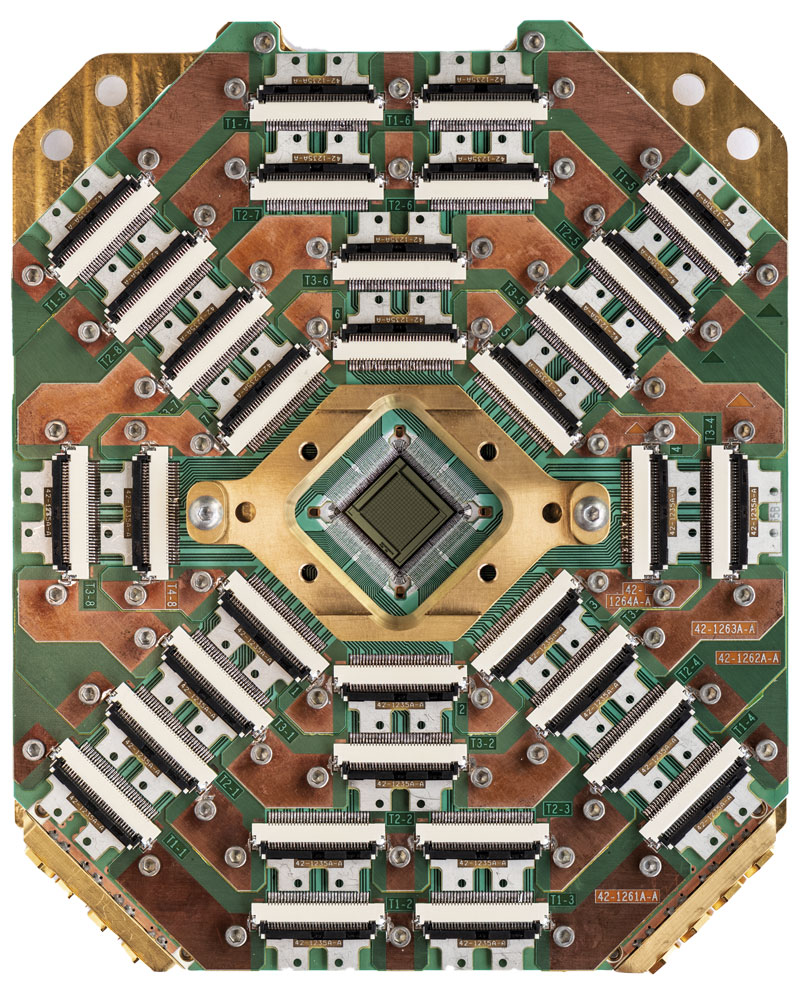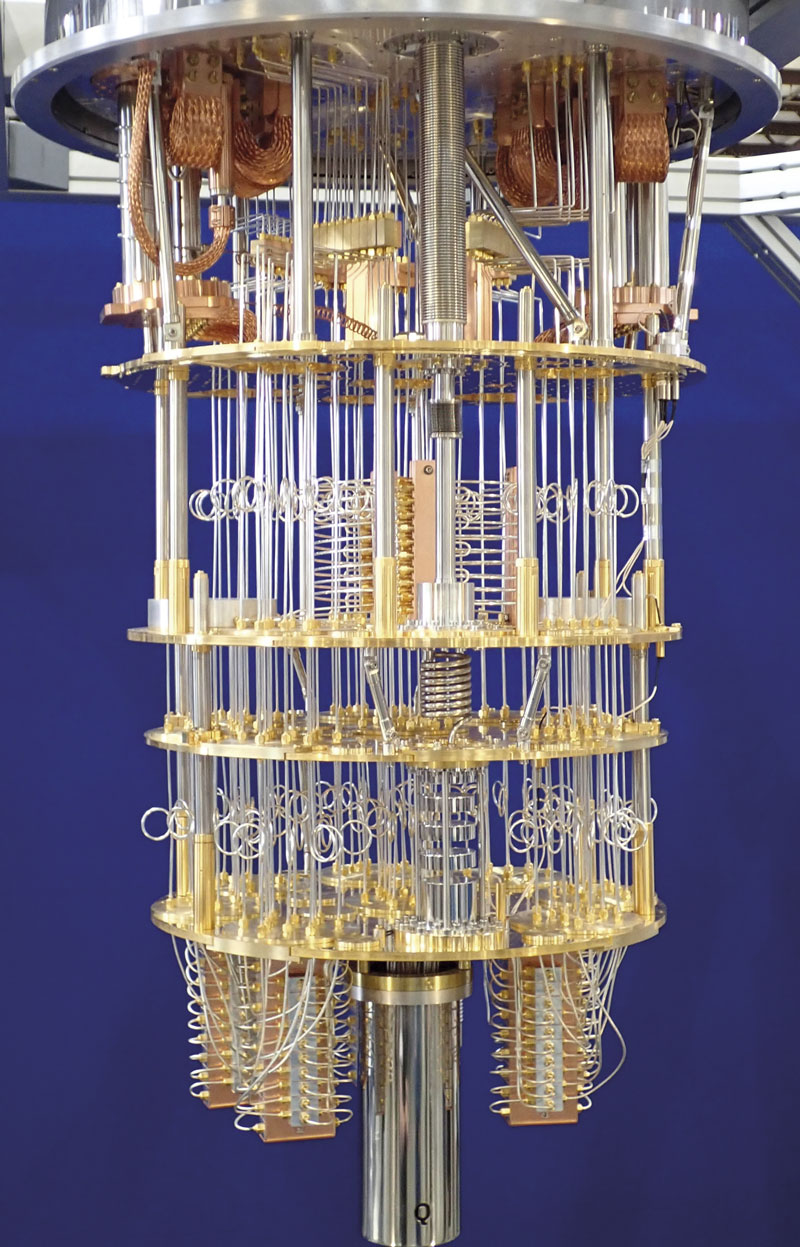
D-WaveA quantum chip from US company D-WaveD-Wave
Besides promoting greater integration with companies and encouraging the formation of startups, research aimed at developing quantum technologies in Brazil needs to make an effort to attract specialists from areas other than physics into their ranks, such as engineers, chemists, mathematicians, and professionals from the computing sector. This way, the path towards the creation of commercial products based on quantum properties can be shortened.
This is one of the central ideas that was discussed by over two dozen researchers, authorities, and entrepreneurs that took part in the thematic conference about Quantum Science and Technology, which took place on April 5 and 8, in Rio de Janeiro and São Paulo, respectively. Organized by FAPESP and by the Rio de Janeiro State Research Foundation (FAPERJ), in partnership with the Brazilian Academy of Sciences (ABC), the event was one of the preparatory activities for the 5th National Science, Technology, and Innovation Conference that was held from June 4 to 6 in Brasília.
Quantum technologies exploit properties of quantum mechanics, which explain the behavior of matter and light on an atomic and subatomic scale. Brazil has around 120 researchers who work within some field of quantum science, with established groups and important scientific research in states such as São Paulo, Rio de Janeiro, Minas Gerais, Pernambuco, and Rio Grande do Norte.
The majority of the team members are physicists. “Our first challenge is to develop quantum engineering,” says math-physicist Marcelo Terra Cunha, of the Institute of Mathematics, Statistics, and Computing of the University of Campinas (IMECC-UNICAMP), one of the coordinators of the conference. “We need to attract people from other areas to collaborate with us.”
The objective is to have teams with professionals from several areas working on the development of quantum technologies, including administration and business specialists. Terra Cunha stressed that the world is entering the so-called second wave of products based on quantum technology. The first wave led to the development of transistors, lasers, and atomic clocks, devices used by countless products in modern society, such as computers, cell phones, and satellite navigation systems.
The second wave is split into three major fields. The largest being quantum computing, based on the exploration of qubits (quantum bits), which would be capable of resolving problems that cannot be faced by classic machines and giving faster answers. “Around 90% of international investments are in this area,” the physicist from UNICAMP commented. The second line of research explores quantum communication and cryptography systems, which guarantee more secure forms of exchanging and protecting information. The third focuses on the creation of quantum sensors, devices that could measure properties, such as electric and magnetic fields, temperature, and pressure.

Steve Crawford / FlickrThe interior of a quantum processor developed by IBMSteve Crawford / Flickr
“We have competent researchers in academia in quantum sciences,” commented physicist Luiz Davidovich, of the Federal University of Rio de Janeiro (UFRJ), another coordinator of the conference. “But, like in other areas, there is a lack of companies developing products in the sector.” Davidovich noted that the domain of quantum technologies is a strategic area, of national interest, and that countries such as the USA, the UK, and China have initiatives to promote the development of quantum technologies linked directly to their central governments. It is estimated that half of global investment in quantum technologies comes from China.
To illustrate the sensitivity of the topic, physicist Ivan Oliveira, of the Brazilian Center for Research (CBPF), says that he used to use, for research purposes, the cloud services provided by the quantum computer of American company D-Wave for a small cost. However, recently, the price of the service has rocketed and, worse still, his access has been blocked. “We are no longer able to use the service,” commented Oliveira, who took part in the event in Rio de Janeiro, held at the headquarters of ABC.
According to physicist Paulo Nussenzveig, of the Physics Institute at the University of São Paulo (IF-USP), Brazil is late to the race to develop quantum technologies, but it is still possible to enter the dispute. He sees good opportunities for the creation of products, like sensors, aimed at areas in which Brazil plays a leading role internationally, such as food production.
One recent noteworthy initiative is the agreement to carry out joint research in quantum technologies signed by FAPESP and FAPERJ in December last year. Another is the agreement signed in 2022 between FAPESP, the Ministry of Science, Technology, and Innovation (MCTI), and the Brazilian Internet Steering Committee (CGI.br) to fund strategic research about the internet. Among the funded projects is the assembly of a physical communication network that uses cryptography based on quantum phenomena to connect the CBPF, UFRJ, the Pontifical Catholic University of Rio de Janeiro (PUC-RIO), and Fluminense Federal University (UFF).
During the event in São Paulo, physicist Gustavo Wiederhecker, of UNICAMP, highlighted the launch of the first public bid of the Quantum Technologies Initiative (QUTIA), a FAPESP program to encourage quantum technologies. “We are going to select five proposals submitted by young researchers at the beginning of their careers who have had a recent experience of at least two years abroad or who are still living there,” says Wiederhecker, coordinator of QUTIA. Those chosen, Brazilians or foreigners, will have to move to São Paulo and will receive five years of funding worth up to US$1 million.
Republish